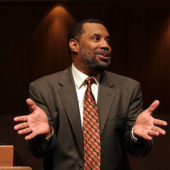What does it really mean to walk with God? Can we determine where we are, or where someone else is, on the faith journey by external evidence? Dr. Mark Muska says it’s important to have a realistic view of walking with God, as believing, but imperfect, people:
“There’s so much more to this idea of walking with God than living some kind of sin-free life–walking through the lilies, as the angels sing, and an organ plays in the background–until we triumphantly end up in heaven. It’s a nice image, but completely unrealistic. There’s a battle to be fought, and that battle is against sin and temptation. We’ll have our successes and we’ll have our failures.”
Muska says the tendency toward legalism, something which overemphasizes our personal good works, creates major roadblocks for our faith journey, as it causes us to pretend our sins and struggles don’t exist, rather than confessing them and attaining forgiveness.
“One of the greatest damages that Christianity does is to get into this Phantom Christianity: that somehow we’re just living to the max, not sinning, and even temptation doesn’t bother us anymore because we are just ‘walking with God.’ There is such a pervasive atmosphere like that in so many churches, and it’s a lie; everybody in that church knows they don’t fit that phantom profile but they’ve got to ‘put the dog on’ for everybody else as if they are. That’s just dead wrong: we are going to have our times of struggle and sometimes deep struggle. Maybe it will go on for years if there’s been deep hurt. Phantom Christianity is poison: none of us can attain that standard and we all know it. Whether we’ll admit it and live it out is another thing.”
Conversely, some of us may become overly comfortable with our sins, and stop struggling against them at all.
“Some people start making excuses: ‘I’m just not perfect and I never will be, so I’m just going to keep on sinning, and Jesus will keep on forgiving me.’
I would seriously, gently, question such a person whether they know Jesus at all, and have any kind of gratitude for His sin payment by dying on the cross. (That attitude) is just completely inconsistent with someone who really gets it–that the Savior came and died for them and provides them forgiveness of sin, that they are now cleansed, they are right with God! To have someone then make excuses and look for reasons to go on doing things that are hateful to God? That’s just completely incongruent.”
“When we become followers of Christ and put our trust in that sin payment, there’s a whole transformation of attitude that comes. Our gratitude shows itself; we desire to please God with our lives.”
Dr. Muska says the walk with God we seek comes when we bypass these two extremes and focus on learning, loving, and living the character of Christ each day.
“If we can avoid the two extremes: that legalism and performance, where you’re always on the treadmill never good enough for God, or making excuses and just keeping on whining and crying about things. There’s a middle ground where we walk with God, we take seriously the idea of pleasing Him with our lives, and when we screw up, confess that; we admit it to God and allow His cleansing to continue to cleanse us.”
Dr. Mark Muska is Professor of Biblical and Theological Studies at University of Northwestern St. Paul. Dr. Muska is a regular guest on Faith Radio, including Connecting Faith‘s Ask the Professor where he answers live calls from listeners.
How to walk with God


















